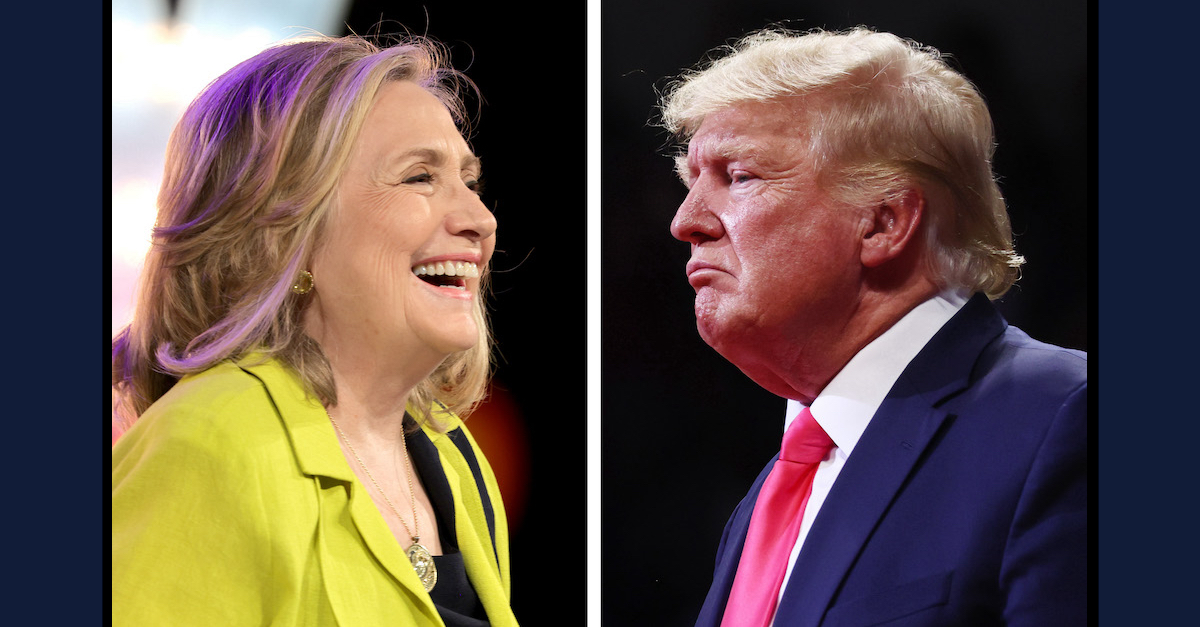
Hillary Clinton was photographed moderating a panel during BroadwayCon 2022 at The Manhattan Center on July 8, 2022 in New York City. Donald Trump was photographed on stage at a ‘Save America’ rally on July 22, 2022 in Prescott Valley, Arizona. (Photo of Clinton by Michael Loccisano/Getty Images; photo of Trump by Mario Tama/Getty Images.)
A federal judge on Friday rubbished a request from Donald Trump’s lawyers to push back a scheduled trial date in a RICO lawsuit the ex-president filed against his former political rival Hillary Clinton over the 2016 election.
Trump’s $24 million lawsuit alleges that Clinton and other associated defendants violated racketeering, conspiracy, injurious falsehood, malicious prosecution, computer fraud and abuse, trade secret, and stored communications laws.
“Plaintiff initiated this action on March 24, 2022,” U.S. District Judge Donald Middlebrooks wrote on Friday. “On April 15, 2022, I entered an Order setting the case for trial on May 8, 2023. Plaintiff now seeks a continuance of the trial date until November 2023. The Motion fails to set forth good cause for the broad relief requested, and it is therefore denied.”
After walking the parties through the specifics of Rule 16(b) of the Federal Rules of Civil Procedure, Middlebrooks continued:
Here, Plaintiff [Trump] attributes the need for the requested six-month extension to the perceived complexity of the case and the generalized need for additional time to complete discovery. These representations are vague, and do not constitute good cause for an extension. Plaintiff fails to offer any specific details about the discovery he anticipates needing or why he will be unable to obtain that discovery before the trial date that I have set. As to the two foreign Defendants who have not yet been served, and the two former federal employees who are not required to respond until September 6, 2022, if Plaintiff requires additional time for discovery as to these Defendants, he may file an appropriate motion supported by specific facts at a later time. But I am not persuaded that granting the broad relief requested here — a six-month continuance — is appropriate at this juncture, before the Scheduling Order has been entered and before the Parties have endeavored to comply with anticipated deadlines. The Court will enter a Scheduling Order in due course. For now, I expect the Parties to prepare this case for trial in accordance with the date that I have set.
A trial is currently scheduled for May 8, 2023 — assuming the case survives a mountain of motions to dismiss the matter. As Law&Crime reported on Thursday, Trump’s attorneys asked to reschedule the matter to November 2023 because of the voluminous evidence they hope to collect.
“This is a complex case, simply as so much evidence will need to be reviewed,” wrote Trump attorney Peter Ticktin. “Due to the multitude of Defendants in the action, and various complexities of the case, the Plaintiff would request that the Trial Date be pushed back 6 months, which is a reasonable amount of time based on the amount of anticipated discovery and motion practice, that will occur.”
Ticktin again complained of “[e]xceptional circumstances,” the “complexities of the case,” the “amount of parties involved in the litigation, and the amount of anticipated discovery” before wrapping up his request to punt the trial.
Clinton’s attorneys — and attorneys for a mountain of other named defendants — objected to the move. The defendants asked Judge Middlebrooks to settle the outstanding motions to dismiss before granting Ticktin’s request to push back the trial. Ticktin’s request was based in part on discovery that might not be needed and on presumed belief that a 45-day trial might be necessary. The defense noted that neither might be necessary if the motions to dismiss succeed.
“As Defendants told counsel for Plaintiff during a conference call on July 15, 2022, until the Court adjudicates the consolidated Motion to Dismiss that the Defendants filed on July 14, 2022, considerations of efficiency, economy, and burden dictate that the parties postpone any discussions about the future of this case until the Court ascertains the number of Defendants and claims, if any, genuinely at issue,” defense counsel wrote.
Clinton’s attorneys moved to dismiss Trump’s original lawsuit and an amended complaint by raising the statute of limitations as a complete bar against recovery on most or all of the allegations. Generally, most federal claims must survive a statute of limitations of four or five years; Trump’s lawsuit deals with conduct which surrounded the 2016 election — more than five and a half years ago. Elsewhere, Clinton’s attorneys wrote that Trump’s many claims fail on the merits and that Trump’s “factual allegations as to individual defendants are insufficient.”
Read the Friday order denying Trump’s attorneys’ request to delay the matter:
[Editor’s note: legal citations have been omitted from some quotes in this piece for ease of readability. The full citations are in the document above.]